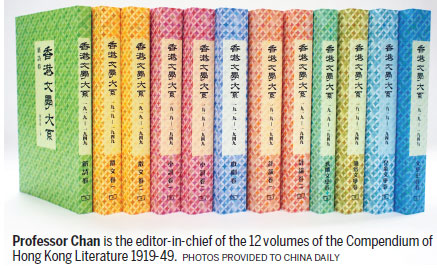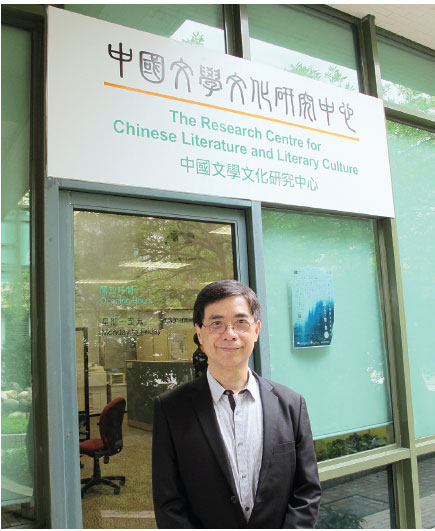Hong Kong a 'floating city in literature'
Updated: 2018-09-13 06:55
By Sylvia Chang in Hong Kong(HK Edition)
|
|||||||||
"All the memories are traces of tears" as a film kicks off its premiere, with a romance starting in pale yellow lights.
The movie 2046, directed by Wong Kar-wai, has earned its name in the film industry. But, its original novel, The Drunkard, by prominent Hong Kong writer Liu Yichang (a.k.a. Lau Yee-cheung), who passed away recently, may not be as widely known as such.
"Hong Kong is a floating city," says Leonard Chan Kwok-kou, chair professor of Chinese Literature at the Education University of Hong Kong (EdUHK).
"People come and go before an internal link is built up with the city," said Chan, adding that this leads to the silence in Hong Kong literature and its uniqueness due to the difficulty in defining Hong Kong authors and their narrations.
The boundaries of Hong Kong literature are not clear, Chan reflected. "Although there is a link between Hong Kong literature, Chinese literature and their Western counterparts, the diverse cultures of the city evidently help create the uniqueness of its literature."
Chan, who heads the Research Centre for Chinese Literature and Literary Culture at the EdUHK, has devoted years of efforts to strengthening the role of Hong Kong literature in history.
Western culture, which originated from Hong Kong's colonial history, has ingrained influence on Hong Kong literature, leading to an interaction of the old and new literature here. At the same time, the city's commercialized society has led to the blossoming of popular literature specializing in local literature.
Popular literature is another feature of Hong Kong literature. Although popular literature only became apparent on the Chinese mainland after the 1980s, it has always been an important part of entertainment in Hong Kong's folk life, even before the founding of the People's Republic of China in 1949. A good example is Di N Hua (literally translated as "the Flower Princess"), which is not only a well-known fictional story widely discussed among the general public, it has established its status in literature.
The reason for the popularization of popular literature in Hong Kong, Chan explained, is the lack of official support for serious literature caused by a free market economy.
Over the years, Chan has been trying to "make it (Hong Kong literature) visible," and then help it disseminate. For example, a collection of 12 books - A Compendium of Hong Kong Literature 1919-49 - which offers a comprehensive presentation of Hong Kong literature from 1919 to 1949. The forms of literature covered include poems, essays, fictions, literary criticism, popular literature, children's literature and old-fashioned literature.
With this collection as a foundation, Chan has begun compiling the second collection covering Hong Kong classical literature from 1950 to 1969.
To further emphasize the uniqueness of Hong Kong literature, Chan wrote a book Hong Kong In Its History of Lyricism, which features "the internal conservation of Hong Kong people with the outside world".
"Many people say Hong Kong has no culture, not to mention literature. But I see the opposite. While Western literature deals with the objectivity of the world, Chinese literature explores people's inner world. It is in this discussion of subjectivity that Hong Kong literature finds its own value," said Chan.
Chan is committed to passing on the heritage of Hong Kong literature to the next generation. He co-organizes the Undergraduate Academic Conference on Humanities - an annual conference that was held for the second time in mid-June. It received over 100 applications from more than 20 universities on the mainland, Hong Kong, Macao and Taiwan. Sixty papers stood out in the end. The topics covered ranged from Chinese classic literature, Chinese modern literature and culture studies to Chinese language studies.
Chan remarked that the conference has helped change the academic landscape of tertiary education in Hong Kong that undergraduate studies on humanities at various universities have been acting on their own accord. The conference also offers a good platform for undergraduates to exchange findings from their studies and learn from each other.
Chan is happy to learn that an increasing number of applications have come from universities on the mainland, Hong Kong, Macao and Taiwan. He expects to turn the conference into an international event in the year to come.
He's also optimistic that Hong Kong literature will become widespread among young people, arguing that digital media has helped make rare Hong Kong literary works accessible. Chan acknowledged that people are currently spending less time reading and have become less patient and sustainable in reading a book on literature. But, he believed that the adaptation of literature in this digital age has helped to promote literature as a public discourse.
In recent years, a documentary series, The Inspired Island, has emerged as a successful adaptation of literature for young audiences. In a poetic film language, and with a beautiful flow of visual pictures, the documentary recorded eminent writers in Hong Kong and Taiwan and their literature works.
Chan expects more to be adopted in a new way with emerging technologies. "In the end, the motivation for further reading is the key to going deeper into literature."
sylvia@chinadailyhk.com


|
Professor Leonard Chan Kwok-kou, director of the Research Centre for Chinese Literature and Literary Culture; chair professor of Chinese Literature, Department of Literature and Cultural Studies at the Education University of Hong Kong. |
(HK Edition 09/13/2018 page24)
